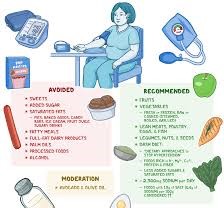What is high blood pressure?

First, let’s get to know the word “blood pressure”. Which means flow that affects the arterial wall. Which is caused by the heart pumping blood.
High blood pressure means a condition. Where level higher than normal. It is a condition. That must controll because causes arteries to gradually deteriorate and become damaged faster than they should be. Which leads to hardening of the arteries, blockage of the arteries, or even rupture of the arteries. Importantly, it is a risk factor for other complications. heart disease, stroke, dementia, or chronic kidney failure.
Check it out! Do you have “high blood pressure” yet?
To know if we have this disease or not, we have to measure with monitor. The measured blood pressure values will have 2 values as follows:
Table of severity classification in people aged 18 years and over
| type | Systolic blood pressure ( mm/Hg)/Diastolic blood pressure (mm/Hg) |
| Normal blood pressure | < 120 and < 80 |
| Normal blood pressure tends to be high | 120-129 and < 80 |
| Stage 1 hypertension | 130-139 and/or 80-89 |
| Stage 2 hypertension | ≥ 140 and/or ≥ 90 |
| Single high systolic pressure | ≥ 140 and < 90 |
Types of hypertension
- Primary Hypertension or Essential Hypertension:
The exact cause of the disease cannot identified. It is most common in people aged 40 and above. The older you get, the more likely you are to get it. - Secondary Hypertension
can be caused by a number of แทงบอล UFABET ราคาดีที่สุด ไม่มีขั้นต่ำ underlying health conditions. Sleep apnea, kidney disease, thyroid problems, adrenal tumors, congenital blood vessel abnormalities, the use of certain medications, or alcohol abuse.
Symptoms of the disease..that we must observe
As mentioned, the scary thing about. This disease is that it often has no symptoms and most of the time the cause of the disease cannot found. However disease detecte during health screening or detecte. When patient visits doctor other diseases. Except for patients with severe hypertension that have symptoms as follows:
- Severe headache
- Have nausea and vomiting
- Feeling tired easily
- Dizziness and fainting often
- Nosebleed
Reduce risky behaviors…avoid high blood pressure.
Long-term control Can achieve by taking care of your health and trying to reduce risky behaviors that lead to the disease.
- You should eat healthy food, reduce sugar, fat and salt.
- Exercise regularly to keep your weight under control.
- No smoking
- Avoid alcoholic beverages
- Allocate appropriate rest time and get enough sleep.
- Reduce stress by doing activities you enjoy.
- Regular health check-ups to measure. If there any abnormalities. They can be treated promptly to bring them back to normal levels.